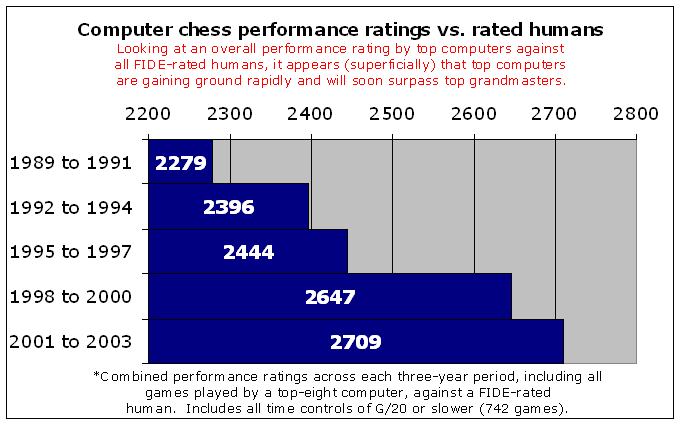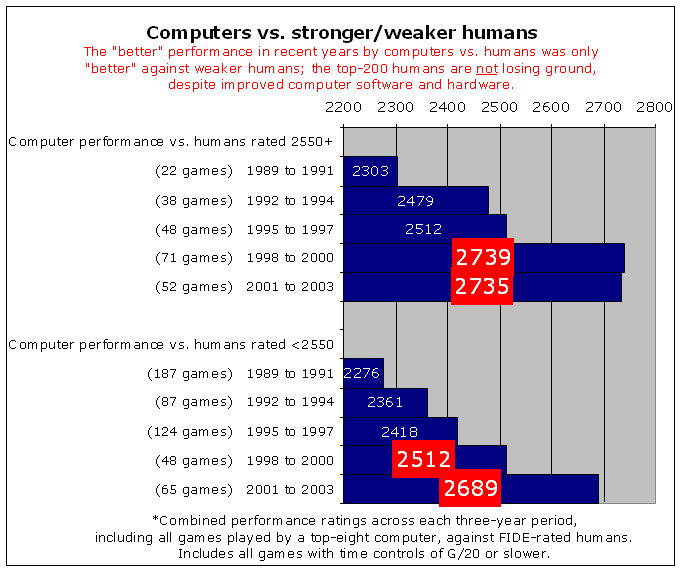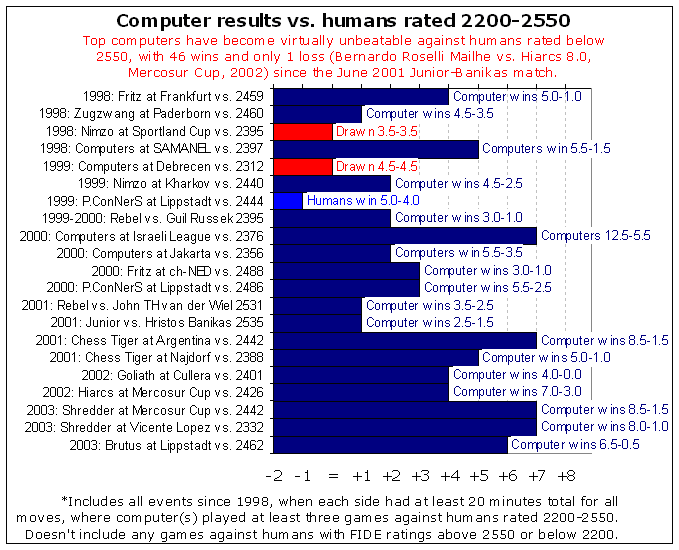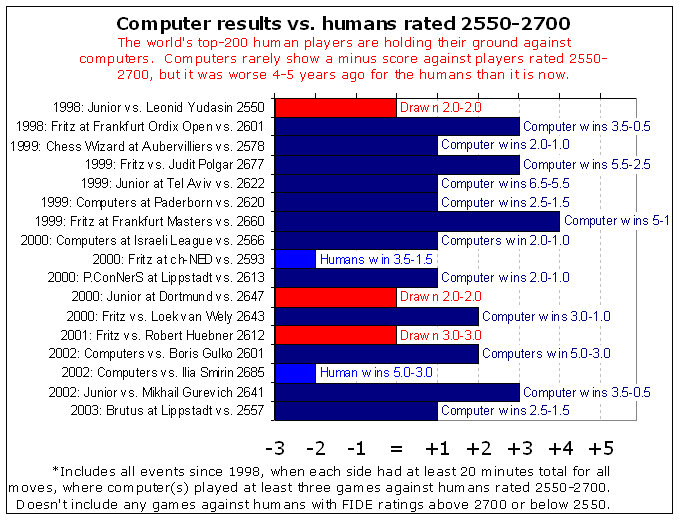Jeff Sonas on Man-Machine, Part II:
Are chess computers improving faster than grandmasters?
In Part I
we looked at the historical results of chess games played between the strongest
grandmasters and the strongest chess computers. The surprising conclusion was
this: top grandmasters and top chess computers are dead-even, and they have
been stuck that way for some time. Neither side has actually won a match from
the other in five years, and the last seven events between grandmasters rated
2700+ and chess computers have all been drawn. How long can this deadlock last?
You're probably thinking, "Okay, sure, they're even now, but isn't it
inevitable that computers will just get better and better and eventually leave
the humans behind?" Well, yes, computers will definitely get better, but
don't forget that human players are improving too! Human players are constantly
getting better at chess; it's just super-hard to measure this statistically,
because improving humans play against other improving humans. It is NOT inevitable
that computers will surpass humans.
Let's look at some numbers and graphs. At first glance, it seems like the top
computers must be gaining considerable ground on the top humans. For instance,
it is quite easy to calculate a performance rating for top computers, in their
games against humans with FIDE ratings. I did this for 742 games over the past
fifteen years, grouped into three-year spans (considering only computers who
were one of the top eight engines in the world at the time). Here are the results:

The overall performance rating of computers against humans has increased at
roughly 30 Elo points per year. This would suggest that however fast humans
are improving, the computers are improving even faster. Thirty Elo points a
year faster. However, if you split these same human opponents into two groups,
based on a rating cutoff point of 2550, an interesting pattern emerges. Computers
are not doing any better against 2550+ players right now, than they were a few
years ago.

Although computers have certainly been more successful in 2001-2003 than ever
before, that is only due to the fact that they are finally starting to dominate
the humans who aren't in the top 200 in the world. As you can see in that graph,
computers are doing no better today, against 2550+ opposition, than they were
three years ago. Let's look at this event-by-event. First, I'll show you the
results against the weaker group, over the past 5-6 years:

Up through mid-2001, a +4 score by a computer, in an event against rated humans,
was almost unheard-of. In the two or three years since then, every single computer
that played in a tournament against sub-2550 humans, has scored between +4 and
+7 against them. Seven straight events, and five different computers, but they
all scored at least +4.
On the other hand, you don't see the same level of improvement by computers
against the stronger players (in the 2550-2700 range). In fact, you don't see
ANY improvement by computers. Let's look at the events since 1998 where computers
faced opponents in that rating class:

Computers are becoming more and more dominant against everyone but the top
200 players in the world. That is leading to an overall performance rating for
computers that is getting higher and higher. However, the players in the top-200
are holding their ground even against the latest and greatest computers. Perhaps
that group will soon shrink down to only the top-100, or the top-50, but not
inevitably, and not irreversibly. As you can see from my previous graphics,
there is no sign that the top-200 players are losing ground at all against the
top computers.
The top 20 humans (the 2700+ crowd) are managing a long string of drawn matches
against computers, and the rest of the top-200 is averaging the same 35% to
40% score that they did a few years ago. So, amazing as it may seem, I don't
see any evidence that the top computers are suddenly going to take over the
chess world. Of course the top computers are improving, mostly through hardware
and software upgrades, but somehow the top humans are improving just as fast,
in other ways.
In Part I, I mentioned that there were two key questions to answer. Let's review
those questions and see what my answers have turned out to be:
Question #1: A decade ago, top grandmasters were undeniably
stronger than chess computers. There was a large gap in strength, roughly 300
Elo points. In chess terms, if a top grandmaster had played 100 games against
a top computer, the grandmaster would have won the match by a score of about
85-15 (roughly speaking). In the past ten years, computers have certainly reduced
the gap. How large is the gap right now, and who is ahead?
Answer #1: There is no measurable gap right now between top
computers and top-20 grandmasters. They have been deadlocked for about five
years. The remaining top-200 grandmasters, as a group, are slightly weaker than
the top computers.
Question #2: Who is improving faster, top grandmasters or
chess computers? What can we say about how the situation will be different in
one year, or ten years, or fifty years?
Answer #2: There is no measurable difference in how fast either
group is improving. There is nothing (yet) to suggest that one or the other
will suddenly pull ahead. It may well be that in ten years the top computers
and top grandmasters will still be deadlocked.
We are at a unique point in chess history, an unprecedented state of dynamic
balance. The top computers have caught up with the top grandmasters, and right
now I'm not convinced that the computers will zoom past the grandmasters. Everything
depends on whether computers or grandmasters can improve faster, starting today.
It may even be that the top humans can figure out how to improve their own anti-computer
play, to the point that they will pull ahead again. Perhaps Garry Kasparov can
lead the way once more.
There is much more to say about how computers and grandmasters are improving,
relative to each other. We'll compare and contrast the various ways that computers
and grandmasters are improving, and how we can try to measure those improvements,
starting with Part III next week.
 |
Jeff Sonas is a statistical chess analyst who has written
dozens of articles since 1999 for several chess websites. He has invented
a new rating system and used it to generate 150 years of historical chess
ratings for thousands of players. You can explore these ratings on his
Chessmetrics website.
Jeff is also Chief Architect for Ninaza, providing web-based medical software
for clinical trials.
Previous articles:
|




























